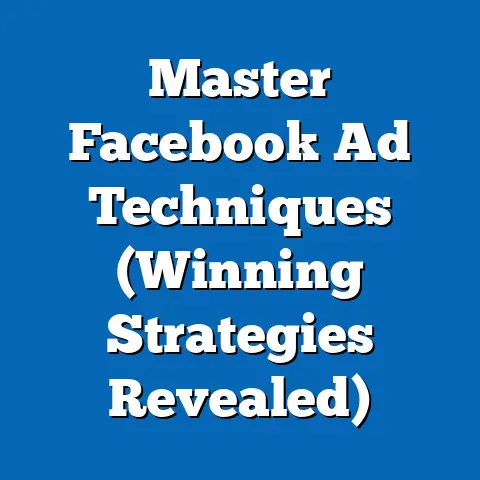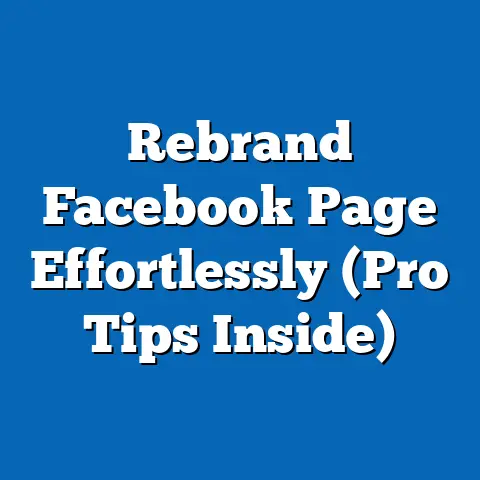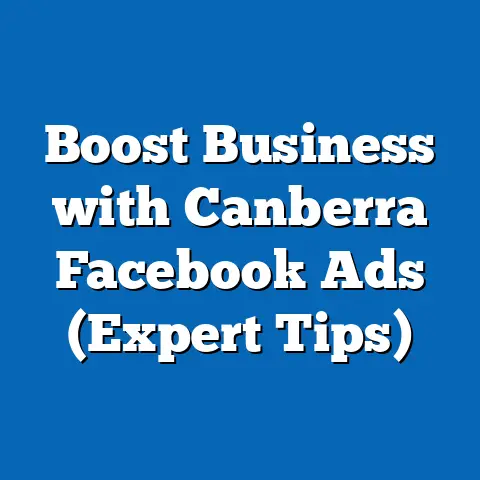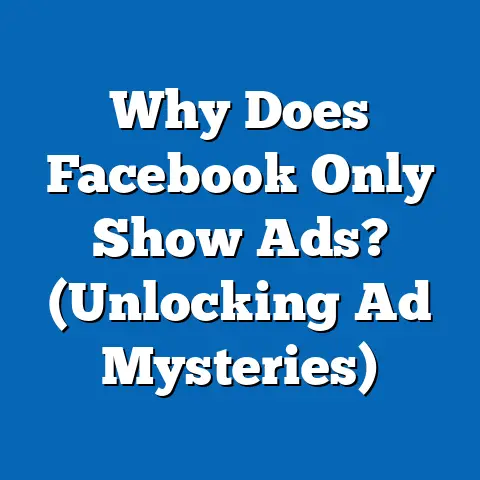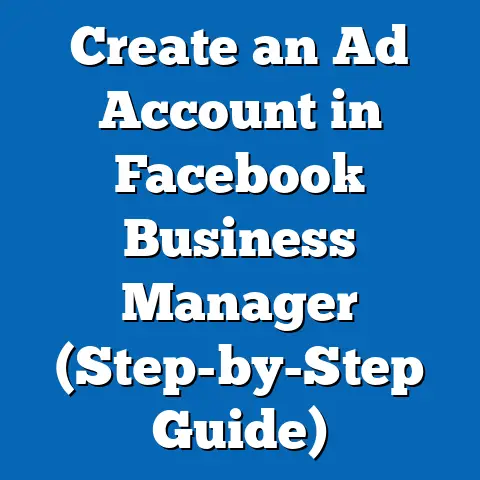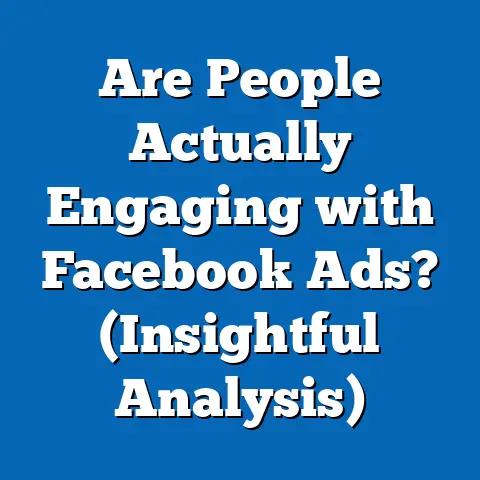Why You Should Cancel Facebook Ad Campaign Now (Smart Strategy)
Are you still pouring money into Facebook ads, hoping for a miracle that just isn’t happening?
I’ve been there.
I remember one client, a local bakery, who was convinced Facebook ads were the only way to reach new customers.
We pumped money into campaigns for months, meticulously targeting foodies and pastry enthusiasts in a 10-mile radius.
The results?
A trickle of website visits and a few extra cupcake sales.
The cost?
More than the profit they generated.
It was a hard lesson, but it taught me that sometimes, the bravest and smartest move is to pull the plug.
In this article, I’m going to explore why canceling your Facebook ad campaign might be the best decision you make for your business right now.
We’ll dive into the shifting landscape of social media advertising, the rising costs and diminishing returns, the challenges of effective targeting, and, most importantly, the alternative strategies that could deliver far better results.
It’s time to question the status quo and see if your ad dollars are truly working for you.
The Shifting Landscape of Social Media Advertising
Social media advertising, especially on platforms like Facebook, isn’t what it used to be.
I remember when Facebook ads were the golden ticket – cheap, effective, and capable of reaching a massive audience with laser-like precision.
It felt like you could whisper your message into the ears of your ideal customer, and they’d come running.
Those days are, sadly, long gone.
The Evolution of Facebook’s Algorithm
Facebook’s algorithm has undergone countless changes over the years, each one impacting the visibility and reach of organic content and ads alike.
Initially, the algorithm favored content from friends and family, prioritizing personal connections over brand messages.
This was a necessary move to combat the sheer volume of content being uploaded, but it inadvertently squeezed out organic reach for businesses.
Then came the shift toward “meaningful social interactions,” a noble goal but one that further complicated the advertising landscape.
This meant that ads had to be even more engaging and relevant to cut through the noise.
But how do you create ads that are both meaningful and attention-grabbing when you’re competing with cat videos and baby pictures?
More recently, Facebook has been prioritizing video content, particularly short-form videos like Reels, in an attempt to compete with TikTok.
This has forced advertisers to adapt and create video ads, even if their product or service is better suited for a different format.
User Engagement Trends: Are People Still Hooked on Facebook?
While Facebook still boasts billions of active users, engagement trends tell a different story.
According to Statista, while Facebook’s daily active users are still high, the growth rate has slowed significantly.
Younger demographics, in particular, are migrating to platforms like TikTok, Instagram, and Snapchat, where content feels fresher and more authentic.
This means that your target audience might not be spending as much time on Facebook as they used to.
If you’re targeting Gen Z, for example, you might be better off focusing your efforts on platforms where they’re more active.
I’ve personally seen this shift firsthand.
Several of my clients who were once heavily invested in Facebook advertising have started diversifying their strategies, allocating more budget to TikTok and Instagram.
The results have been promising, with some seeing a significant increase in engagement and conversions.
The Increased Competition in Ad Space
The sheer number of businesses advertising on Facebook has exploded in recent years.
This increased competition has driven up ad costs and made it harder to stand out from the crowd.
Everyone is vying for the same attention, targeting the same demographics, and using similar messaging.
Think of it like a crowded concert venue.
Everyone is shouting to be heard, but nobody can make out what anyone is saying.
Your ad, no matter how well-crafted, is just another voice in the cacophony.
This competition is further exacerbated by the fact that Facebook has limited ad inventory.
There are only so many ad slots available, and the more advertisers there are, the more expensive those slots become.
Takeaway: The social media landscape is constantly evolving, and Facebook is no longer the undisputed king of advertising.
User engagement is shifting, competition is intensifying, and algorithms are becoming increasingly complex.
It’s crucial to stay informed and adapt your strategies accordingly.
Rising Costs and Decreasing ROI
One of the most compelling reasons to reconsider your Facebook ad campaign is the rising cost of advertising on the platform coupled with the diminishing returns you’re likely seeing.
It’s not uncommon for businesses to feel like they’re throwing money into a black hole, with little to show for it.
The Soaring Cost of Facebook Ads
The cost of Facebook ads has been steadily increasing for years, driven by factors like increased competition, algorithm changes, and privacy regulations.
According to Statista, the average cost per click (CPC) on Facebook has risen significantly over the past few years.
This means that you’re paying more for each click, but are you getting more value?
In many cases, the answer is no.
The quality of traffic from Facebook ads has also been declining, with many users clicking on ads out of curiosity rather than genuine interest.
I remember one client, a small e-commerce store selling handmade jewelry, who saw their CPC double in just a few months.
They were still getting a decent number of clicks, but their conversion rate plummeted.
They were essentially paying twice as much for half the results.
Diminishing Returns on Ad Spend
The concept of diminishing returns is simple: as you invest more money into a particular activity, the incremental benefit you receive decreases.
This is certainly true for Facebook ads.
As you increase your ad spend, you may see an initial increase in sales, but eventually, you’ll hit a point where the additional revenue generated is not worth the additional cost.
This can happen for a variety of reasons.
You might be reaching the same users repeatedly, leading to ad fatigue.
Your targeting might be too broad, resulting in wasted ad spend.
Or your ads might simply be getting lost in the noise.
I’ve seen this happen time and time again.
Businesses start out excited about Facebook ads, seeing a quick boost in sales.
But as they scale their campaigns, they find that their ROI starts to decline.
They’re spending more money, but they’re not getting the same return.
Eroding Profit Margins
The combination of rising costs and diminishing returns can have a devastating impact on your profit margins.
You might be generating more revenue, but if your advertising costs are eating up a larger and larger share of that revenue, you’re not actually making more money.
This is a particularly dangerous situation for small businesses with tight margins.
They might be tempted to keep spending on Facebook ads in the hope of increasing sales, but they’re actually digging themselves into a deeper hole.
I’ve worked with several clients who were in this exact situation.
They were so focused on growing their revenue that they didn’t realize their profit margins were shrinking.
They were essentially working harder and harder to make less and less money.
Takeaway: Don’t blindly throw money at Facebook ads without carefully tracking your ROI.
The rising costs and diminishing returns can quickly erode your profit margins and leave you worse off than before.
Targeting Challenges and Audience Saturation
Even if you’re willing to pay the rising costs of Facebook ads, you might still be struggling to achieve your desired results due to targeting challenges and audience saturation.
It’s becoming increasingly difficult to reach the right people with the right message at the right time.
The Illusion of Precision Targeting
Facebook’s targeting options are undeniably impressive.
You can target users based on demographics, interests, behaviors, and even their past purchase history.
It seems like you can reach almost anyone with pinpoint accuracy.
However, the reality is often far more complex.
Facebook’s data is not always accurate or up-to-date.
Users’ interests and behaviors can change over time, and their stated preferences might not reflect their actual intentions.
Moreover, Facebook’s targeting algorithms can be opaque and unpredictable.
You might think you’re targeting a specific audience, but Facebook might be showing your ads to a different group of users entirely.
I remember one client who was targeting dog owners with ads for their pet supplies store.
They were using Facebook’s interest-based targeting, selecting categories like “dog lovers” and “dog breeds.” However, they quickly realized that their ads were being shown to people who had simply liked a dog-related page or watched a dog video once.
They weren’t necessarily active dog owners.
Audience Fatigue and Saturation
Even if you manage to target the right audience, you might still be facing the problem of audience fatigue and saturation.
If you’re showing the same ads to the same people repeatedly, they’re going to get tired of seeing them.
They’ll start to ignore your ads, or worse, they’ll develop a negative association with your brand.
This is particularly true for retargeting campaigns, where you’re showing ads to users who have already visited your website.
While retargeting can be effective, it’s important to avoid overdoing it.
Showing the same ad to the same person dozens of times a day is a surefire way to annoy them.
I’ve seen this happen with several clients who were running aggressive retargeting campaigns.
They were showing ads to users who had visited their website, but they weren’t tailoring the ads to their specific interests or needs.
The users quickly became annoyed and started blocking their ads.
The Impact of Privacy Changes
Recent privacy changes, such as Apple’s App Tracking Transparency (ATT) feature, have further complicated the targeting landscape.
ATT requires apps to obtain users’ permission before tracking their activity across other apps and websites.
This has made it more difficult for Facebook to collect data on users’ behavior, which in turn has reduced the effectiveness of its targeting algorithms.
Many users have opted out of tracking, limiting the amount of data that Facebook can collect.
This has made it harder to target users based on their interests and behaviors, and it has also reduced the accuracy of Facebook’s attribution models.
I’ve seen this impact firsthand.
Clients who were previously relying on Facebook’s detailed targeting options have found that their campaigns are no longer as effective.
They’re reaching fewer people, and their conversion rates have declined.
Takeaway: Don’t rely solely on Facebook’s targeting options.
Experiment with different targeting strategies, monitor your results closely, and be prepared to adapt to changing privacy regulations.
Alternative Strategies for Marketing Success
If Facebook ads are no longer delivering the results you need, it’s time to explore alternative marketing strategies.
There are many other ways to reach your target audience, and some of them might be more effective and cost-efficient than Facebook ads.
Influencer Marketing: Leveraging the Power of Trust
Influencer marketing involves partnering with individuals who have a large and engaged following on social media.
These influencers can promote your brand, product, or service to their audience, helping you reach new customers and build brand awareness.
Influencer marketing can be particularly effective because it leverages the power of trust.
People are more likely to trust recommendations from influencers they admire and follow than they are to trust traditional advertising.
I’ve seen this work wonders for several clients.
One client, a fitness apparel brand, partnered with several fitness influencers who regularly posted about their products on Instagram.
The results were impressive, with the brand seeing a significant increase in sales and website traffic.
Search Engine Optimization (SEO): Attracting Organic Traffic
Search Engine Optimization (SEO) is the process of optimizing your website and content to rank higher in search engine results pages (SERPs).
This can help you attract more organic traffic to your website, which is traffic that comes from users searching for relevant keywords on Google or other search engines.
SEO can be a long-term investment, but it can also deliver significant results.
Once you’ve optimized your website and content, you can continue to attract organic traffic for years to come.
I’ve helped several clients improve their SEO and attract more organic traffic.
One client, a local plumbing company, saw their website traffic double after I optimized their website for relevant keywords like “plumber near me” and “emergency plumbing services.”
Content Marketing: Providing Value and Building Relationships
Content marketing involves creating and sharing valuable, relevant, and consistent content to attract and engage your target audience.
This content can take many forms, including blog posts, articles, videos, infographics, and social media updates.
Content marketing is a great way to build relationships with your audience, establish yourself as an expert in your industry, and drive traffic to your website.
By providing valuable content, you can attract users who are genuinely interested in your product or service.
I’ve worked with several clients who have successfully implemented content marketing strategies.
One client, a financial planning firm, created a blog that provided valuable advice on topics like retirement planning, investing, and saving for college.
The blog attracted a large and engaged audience, and it helped the firm generate leads and acquire new clients.
Email Marketing: Nurturing Leads and Driving Sales
Email marketing involves sending targeted emails to your subscribers to nurture leads, promote your products or services, and drive sales.
Email marketing can be a highly effective way to stay in touch with your audience and build relationships over time.
Email marketing can also be a cost-effective way to generate leads and drive sales.
You can automate your email marketing campaigns using tools like Mailchimp or ConvertKit, allowing you to reach a large audience with minimal effort.
I’ve helped several clients improve their email marketing campaigns.
One client, an e-commerce store selling organic skincare products, saw their email open rates and click-through rates increase significantly after I helped them segment their email list and personalize their email messages.
Takeaway: Don’t put all your eggs in one basket.
Explore alternative marketing strategies that can deliver better results and diversify your marketing efforts.
The Psychological Impact of Continuously Running Ads
Beyond the financial implications, there’s a significant psychological impact of continuously running Facebook ads that aren’t performing.
It’s easy to get caught in a cycle of hope and disappointment, which can take a toll on your mental well-being and decision-making abilities.
Cognitive Dissonance: Justifying the Spend
Cognitive dissonance is the mental discomfort that arises when you hold conflicting beliefs or values.
In the context of Facebook ads, cognitive dissonance can occur when you believe that Facebook ads are essential for your business, but your ads aren’t delivering the results you expect.
To reduce this discomfort, you might start to rationalize your ad spend.
You might tell yourself that the ads are still generating brand awareness, even if they’re not driving sales.
You might blame external factors, like the economy or your competitors, for the poor performance of your ads.
This can lead you to continue investing in Facebook ads, even when it’s clear that they’re not working.
You’re essentially trying to justify your past decisions, rather than making rational decisions based on the current data.
I’ve seen this happen with several clients.
They were so convinced that Facebook ads were the only way to reach new customers that they refused to consider alternative strategies, even when their ads were consistently underperforming.
They were essentially trapped in a cycle of cognitive dissonance.
The Emotional Toll of Poor Ad Performance
Poor ad performance can also take an emotional toll on business owners and marketing teams.
It’s frustrating to spend time and money on ads that don’t deliver the results you expect.
It can lead to feelings of discouragement, disappointment, and even anger.
This can impact your motivation and creativity, making it harder to develop effective marketing strategies.
You might start to feel like you’re banging your head against a wall, and you might lose your passion for marketing.
I’ve seen this happen with several marketing teams.
They were so focused on trying to make Facebook ads work that they neglected other important aspects of their marketing strategy.
They became burned out and demotivated, and their overall marketing performance suffered.
The Importance of Detachment and Objectivity
To avoid the psychological pitfalls of poor ad performance, it’s important to cultivate detachment and objectivity.
This means being able to step back from your ad campaigns and evaluate them rationally, without letting your emotions cloud your judgment.
It’s also important to be willing to admit when something isn’t working.
Don’t be afraid to pull the plug on your Facebook ad campaign if it’s not delivering the results you need.
It’s better to cut your losses and move on to a more effective strategy.
I’ve found that it helps to have a third-party perspective.
Working with a marketing consultant or agency can provide you with an objective assessment of your ad campaigns and help you make informed decisions.
Takeaway: Be aware of the psychological impact of poor ad performance.
Cultivate detachment and objectivity, and don’t be afraid to pull the plug on your Facebook ad campaign if it’s not delivering the results you need.
Case Studies of Businesses That Canceled Their Facebook Ads
To illustrate the potential benefits of canceling your Facebook ad campaign, let’s examine some real-world case studies of businesses that made this decision and saw positive results.
Case Study 1: The Local Restaurant
A local restaurant was spending a significant portion of their marketing budget on Facebook ads, targeting users within a 5-mile radius.
They were promoting their menu, daily specials, and upcoming events.
However, they were seeing a low return on their ad spend, with few customers mentioning the ads when they came in to dine.
After analyzing their data, they realized that most of their customers were coming from word-of-mouth referrals and online reviews.
They decided to cancel their Facebook ad campaign and focus on improving their online reputation and customer service.
They invested in training their staff to provide exceptional service, encouraging customers to leave reviews on Yelp and Google, and responding promptly to online feedback.
As a result, their online ratings improved, and they saw a significant increase in foot traffic.
Case Study 2: The E-commerce Store
An e-commerce store selling handmade crafts was running Facebook ads to drive traffic to their website.
They were targeting users interested in crafts, DIY projects, and handmade goods.
However, they were seeing a high bounce rate and low conversion rate, indicating that their ads were not attracting the right audience.
They decided to cancel their Facebook ad campaign and focus on improving their website content and SEO.
They created high-quality product descriptions, optimized their website for relevant keywords, and built backlinks from other websites in their niche.
As a result, their website traffic increased significantly, and they saw a dramatic improvement in their conversion rate.
They were attracting more qualified leads who were genuinely interested in their products.
Case Study 3: The Consulting Firm
A consulting firm was running Facebook ads to generate leads for their services.
They were targeting business owners and executives interested in improving their operations and profitability.
However, they were seeing a low lead quality, with many of the leads not being qualified or interested in their services.
They decided to cancel their Facebook ad campaign and focus on building relationships with potential clients through networking and content marketing.
They attended industry events, spoke at conferences, and published valuable articles on their website and LinkedIn.
As a result, they generated more high-quality leads and closed more deals.
They were building relationships with potential clients who were genuinely interested in their services and trusted their expertise.
Takeaway: These case studies demonstrate that canceling your Facebook ad campaign can be a smart decision, especially if you’re not seeing a positive return on your investment.
By focusing on alternative strategies like word-of-mouth marketing, SEO, content marketing, and networking, you can often achieve better results and build more sustainable relationships with your customers.
The Importance of Flexible Marketing Strategies
The key takeaway from all of this is the importance of adopting flexible marketing strategies that can adapt to changing trends and consumer behavior.
The marketing landscape is constantly evolving, and what works today might not work tomorrow.
Regularly Reviewing and Reassessing Your Marketing Efforts
It’s crucial to regularly review and reassess your marketing efforts, rather than sticking with a strategy out of inertia.
This means tracking your results, analyzing your data, and making adjustments as needed.
I recommend setting aside time each month to review your marketing performance.
Look at your website traffic, lead generation, conversion rates, and customer acquisition costs.
Identify what’s working and what’s not working, and make changes accordingly.
Don’t be afraid to experiment with new strategies and tactics.
The best way to stay ahead of the curve is to be constantly testing and learning.
Thinking Critically About Your Marketing Spend and Outcomes
It’s also important to think critically about your marketing spend and outcomes.
Are you getting a good return on your investment?
Are your marketing efforts aligned with your overall business goals?
Don’t be afraid to challenge your assumptions and question the status quo.
Just because you’ve always done things a certain way doesn’t mean it’s the best way.
I encourage you to take a step back and evaluate your current advertising efforts.
Are you truly reaching your target audience?
Are you generating qualified leads?
Are you driving sales?
If the answer to any of these questions is no, it might be time to reconsider your Facebook ad campaign.
Adapting to Changing Trends and Consumer Behavior
Finally, it’s essential to adapt to changing trends and consumer behavior.
The way people interact with brands and make purchasing decisions is constantly evolving.
Stay informed about the latest marketing trends and technologies.
Read industry blogs, attend conferences, and network with other marketers.
Be willing to embrace new strategies and tactics, even if they seem unconventional.
The most successful marketers are those who are willing to take risks and experiment with new ideas.
Takeaway: Flexibility is key to marketing success.
Regularly review your efforts, think critically about your spend, and adapt to changing trends.
Conclusion
Canceling your Facebook ad campaign might seem like a radical decision, but it can be a smart strategy for many businesses.
The social media landscape is constantly evolving, and Facebook is no longer the undisputed king of advertising.
Rising costs, diminishing returns, targeting challenges, and audience saturation can all make Facebook ads a less effective marketing channel.
By exploring alternative strategies like influencer marketing, SEO, content marketing, and email marketing, you can often achieve better results and build more sustainable relationships with your customers.
It’s also important to be aware of the psychological impact of poor ad performance and to cultivate detachment and objectivity.
I encourage you to take a step back, evaluate your current advertising efforts, and consider whether your resources could be better allocated elsewhere.
Don’t be afraid to pull the plug on your Facebook ad campaign if it’s not delivering the results you need.
It might be the best decision you make for your business.
Remember that bakery client I mentioned at the beginning?
After we shifted their budget to focus on local SEO and community engagement, they saw a significant increase in sales and a much stronger connection with their customers.
Sometimes, less truly is more.

